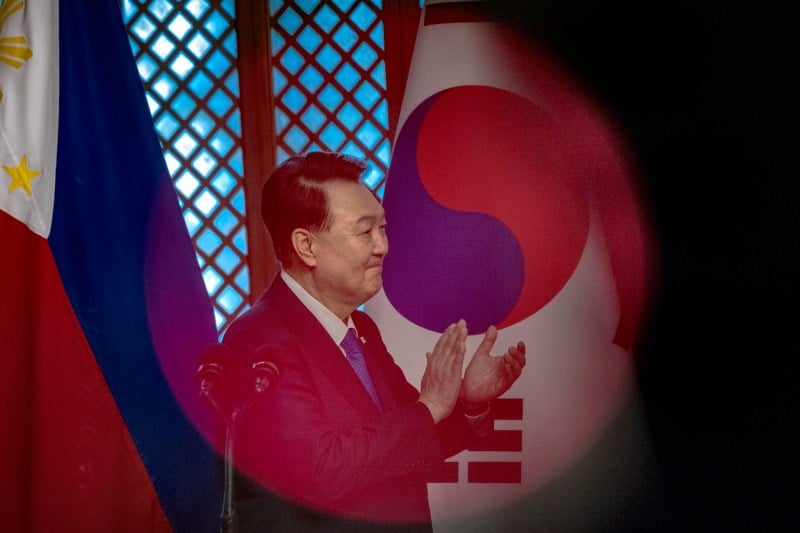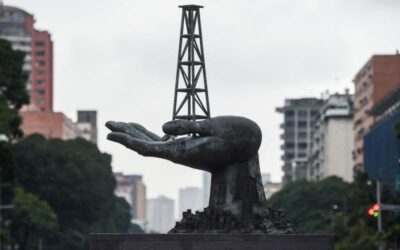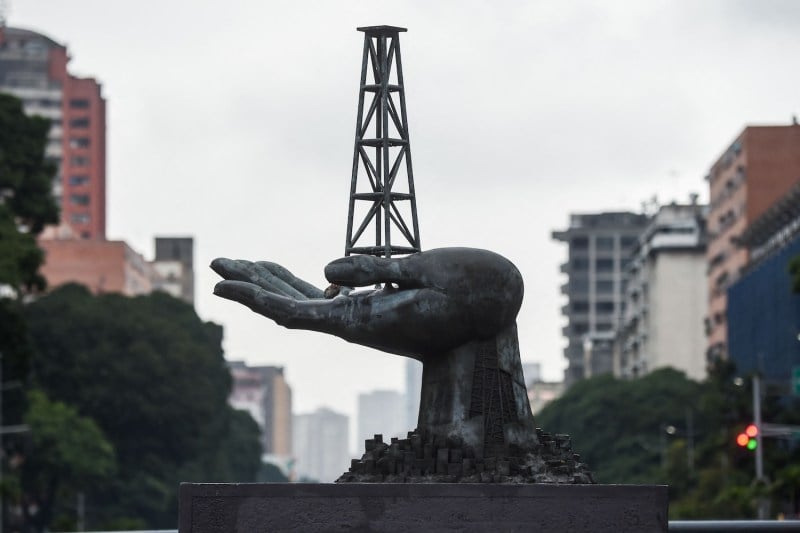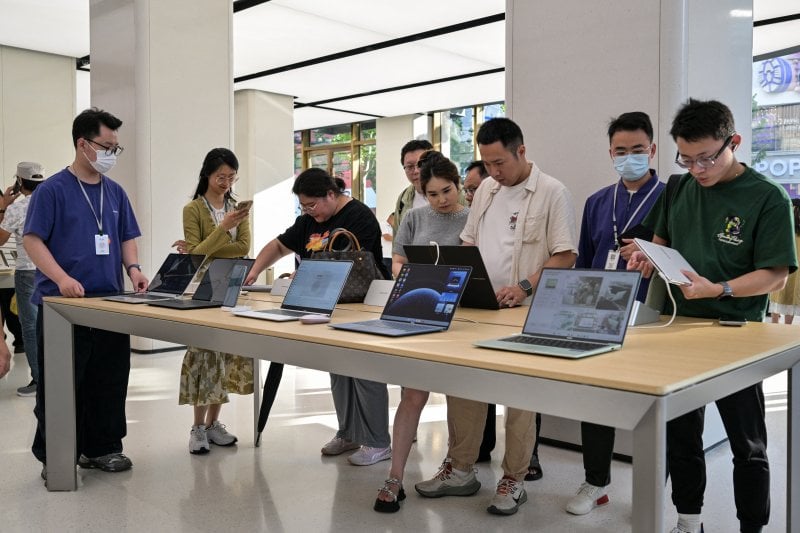Yoon’s Disappointing Foreign-Policy Legacy

Yoon’s Disappointing Foreign-Policy Legacy
The impeached South Korean president leaves behind a record riddled with contradictions.
South Korean President Yoon Suk-yeol applauds during his meeting with Philippine President Ferdinand Marcos Jr. in Manila, Philippines, on Oct. 7, 2024. Ezra Acayan/Getty Images
On April 4, South Korea’s Constitutional Court unanimously upheld President Yoon Suk-yeol’s impeachment, cutting his presidency more than two years short and bringing South Korea’s self-coup saga—set in motion by his declaration of martial law on Dec. 3, 2024—to a close.
As president, Yoon put forth a grand vision for South Korea’s expanded role in the world, but he leaves behind a legacy riddled with contradictions. His lofty rhetoric was never translated into meaningful action.
On April 4, South Korea’s Constitutional Court unanimously upheld President Yoon Suk-yeol’s impeachment, cutting his presidency more than two years short and bringing South Korea’s self-coup saga—set in motion by his declaration of martial law on Dec. 3, 2024—to a close.
As president, Yoon put forth a grand vision for South Korea’s expanded role in the world, but he leaves behind a legacy riddled with contradictions. His lofty rhetoric was never translated into meaningful action.
On the campaign trail, Yoon promised to transform South Korea into a “‘global pivotal state,’ one that advances freedom, peace, and prosperity through liberal democratic values and substantial cooperation.” Critical of the previous administration’s foreign policy, which he described as “parochial and shortsighted,” Yoon vowed to position South Korea as a more responsible and respected member of the international community. Most notably, he wanted to shift South Korea’s foreign policy from “strategic ambiguity”—which involved hedging between the United States and China—to “strategic clarity,” explicitly aligning with Washington. He also pledged to repair ties with Japan and to expand development assistance worldwide.
After his narrow election victory, Yoon took office in May 2022. Later that year, his administration unveiled its Indo-Pacific Strategy, which closely aligned with the United States’ regional objectives: upholding the rules-based international order, promoting democracy and human rights, ensuring peace and stability across the Taiwan Strait, and safeguarding freedom of navigation in the South China Sea. Unsurprisingly, the strategy received widespread praise from the United States and other like-minded countries.
But from the outset, the strategy appeared more aspirational than strategic, outlining broad objectives without clear implementation plans specifying the methods and resources necessary for their realization.
For instance, despite repeatedly affirming its commitment to advancing peace and stability across the Taiwan Strait, South Korea has yet to participate in freedom of navigation operations in the region nor has it demonstrated its capacity and willingness to assist Taiwan in the event of a Chinese invasion. Yoon’s administration was reluctant to define South Korea’s role in a Taiwan contingency or even mention such scenarios explicitly. Beyond military considerations, Yoon even declined to meet with then-U.S. House Speaker Nancy Pelosi during her visit to South Korea in August 2022, just a day after her stop in Taiwan, a visit that drew Beijing’s ire. These actions—or lack thereof—heighten skepticism about Seoul’s intentions.
Whereas Yoon’s administration took few concrete steps to strengthen collective deterrence against China, Japan significantly increased its military presence in the region during his tenure, conducting joint exercises with the Philippines, Australia, and India and participating in freedom of navigation operations in the Taiwan Strait.
On the diplomatic front, Yoon deserves credit for an unprecedented deepening of ties with Japan, which in turn facilitated trilateral cooperation with the United States. Since the historic Camp David summit in August 2023, security and defense officials from the three countries have met at least 80 times and conducted multiple joint military exercises, including the first-ever multidomain exercise focused on missile defense, anti-submarine warfare, and cyber-operations. However, his rushed and politically misaligned push for reconciliation sparked public backlash, and any progress made is likely to be reversed by future administrations. Moreover, even this trilateral cooperation does not necessarily demonstrate a broader commitment to regional or global stability, as much of this security framework was primarily aimed at countering North Korea’s nuclear threats.
At times, Yoon showed himself capable of leadership on a bigger stage. In a historic first for a South Korean leader, Yoon participated in the 2022 NATO summit in Madrid, and his administration went on to provide humanitarian aid and non-lethal military equipment to Ukraine. It also hosted the inaugural Korea-Pacific Islands Summit and increased the official development assistance budget to support developing countries and narrow the global wealth gap.
But with regard to other global issues of the past three years, Yoon failed to leave a mark. For instance, his administration’s response to China’s repeated assaults on Philippine vessels in the Second Thomas Shoal—which resulted in serious injuries to Filipino sailors—was notably weak, especially given that South Korea under Yoon elevated its relationship with the Philippines to a strategic partnership. His administration limited its response to expressing “grave concern” and stressing “the importance of … the rules-based maritime order in the South China Sea,” without directly naming Beijing.
Again, this stands in stark contrast to Japan, which conducted military exercises in the South China Sea—both bilaterally with the Philippines and multilaterally with the United States and other partners—and provided coastal surveillance radars and vessels free of charge. In July 2024, Tokyo also signed a landmark agreement with Manila allowing for the mutual deployment of forces on each other’s territory, further strengthening their military cooperation.
Under Yoon, South Korea did take some concrete actions on the human rights front. It signaled a commitment to addressing human rights abuses in North Korea and significantly increased support for North Korean defectors. In July 2022, Yoon appointed an ambassador for North Korean human rights—a position that had been vacant for years. And in March 2023, Yoon’s administration publicly released the Unification Ministry’s annual report on North Korean human rights for the first time. His administration advocated for the resumption of an open meeting at the U.N. Security Council on North Korean human rights, which had been on a six-year hiatus, resulting in one being held in August 2023. As the rotating chair of the U.N. Security Council in June 2024, South Korea convened another such meeting, reaffirming its commitment to the issue.
Outside of North Korea, however, the Yoon administration’s so-called value-driven diplomacy—another pillar of its global pivotal state vision—proved hollow in practice. Despite its rhetorical commitment to universal values, including freedom, human rights, and the rule of law, it consistently avoided taking a clear stance on these principles when doing so carried costs.
Notably, in 2022, South Korea declined to join 50 U.N. member states in issuing a joint declaration condemning China’s human rights abuses against Muslims in Xinjiang. The Yoon administration repeatedly refrained from endorsing similar joint statements in 2023 and 2024. The administration attempted to justify its stance by claiming that “not participating in the statement does not mean that the administration’s commitment to pursuing its values has changed.” However, its selective condemnation of human rights violations—seen in its vocal criticism of North Korea’s human rights abuses and its silence on China’s—suggests that its approach was dictated by strategic interests rather than by principle.
The Yoon administration’s commitment to upholding the rule of law in its diplomacy was also highly questionable. In August 2022, just six months after Russia’s invasion of Ukraine, South Korea’s state-owned Korea Hydro & Nuclear Power secured a deal worth more than $2 billion to assist Russia in constructing a nuclear power plant in Dabaa, Egypt. While this agreement did not violate international sanctions—since Russia’s nuclear energy sector was not subject to them—it directly contradicted Yoon’s professed commitment to value-driven diplomacy.
South Korea’s involvement has not only helped Russia avoid isolation in the global nuclear market during its war in Ukraine but also expanded Moscow’s influence in the Middle East. Shortly after the deal was announced, Yoon declared that it would “be a great help to restoring the struggling nuclear power ecosystem,” without expressing any qualms about collaborating with Russia, which had blatantly violated international law by invading a sovereign country.
What’s more, in a blatant disregard for international rules and norms, Yoon declared in January 2023 that if the threat from North Korea escalated, “our country will introduce tactical nuclear weapons or build them on our own.” Although never pursued, nuclear armament would have turned South Korea into an international pariah; the mere suggestion damaged South Korea’s credibility on the international stage.
On more than one occasion, Yoon’s foreign policy prioritized economic interests over not only values-based interests but also strategic ones. One of South Korea’s biggest contributions to foreign affairs under Yoon was arms sales. During his tenure, South Korea became the world’s 10th-largest arms exporter. It played a role in helping European countries, such as Poland, Finland, and Romania, to counter Russia. It also helped Indo-Pacific countries, including the Philippines, Indonesia, and Australia, counter China. South Korea also inked arms deals with India and Vietnam, which could reduce their reliance on Russian arms. These efforts ease the burden on the already strained U.S. defense industrial base and provide cost-effective alternatives for developing countries that cannot afford expensive U.S. weaponry.
Yet the Yoon administration’s arms exports lacked a broader geopolitical strategy or alignment with South Korea’s global pivotal state vision. The Yoon administration could have made greater efforts to donate or sell older but still effective systems at significantly reduced prices to developing countries, even if not economically profitable—while also providing training in weapons maintenance and repair, a critical need for many of these countries. Instead, Yoon celebrated the unprecedented financial gains from arms deals but failed to maximize the possible contribution to global peace and stability.
In light of all this, Yoon’s global pivotal state vision amounted to little more than empty rhetoric. The fact that the Indo-Pacific Strategy was drafted by the North American Affairs Bureau of the Ministry of Foreign Affairs—rather than the relevant regional bureaus, such as the Asian and Pacific Affairs Bureau—suggests that the strategy’s primary aim was to please Washington rather than to enhance South Korea’s role in regional peace and stability.
There was a stark gulf between what Yoon claimed his foreign policy would be and what it actually was. His vision for South Korea to contribute to global peace and prosperity based on liberal values ended without ever materializing. The country’s contributions to global challenges were limited, and Yoon’s national security policy was largely confined to the Korean Peninsula. Moreover, Yoon’s so-called value-driven diplomacy was full of inconsistencies, often seeming driven more by strategic interests than by genuine commitment to liberal values.
Some have pointed out the irony of a South Korean president who vociferously championed democracy and a rules-based order abroad while simultaneously undermining democratic institutions and the rule of law at home. But for this to be ironic, Yoon’s overseas commitments would have had to have been sincere. Rather, his domestic actions confirm that his international commitments were little more than lip service in the first place.
Lami Kim is a professor at the Daniel K. Inouye Asia-Pacific Center for Security Studies, a U.S. Defense Department institute based in Hawaii, and a nonresident fellow at the Institute for Global Affairs at Eurasia Group. The views expressed are those of the author and do not necessarily reflect the official policy or position of the U.S. government or Defense Department.
More from Foreign Policy
-

An illustration shows a golden Cybertruck blasting through a U.S. seal of an eagle holding arrows and laurel. Is America a Kleptocracy?
Here’s how life could change for the rich, poor, and everyone in between.
-

The flag of the United States in New York City on Sept. 18, 2019. America Is Listing in a Gathering Storm
Alarms are clanging at the U.S. geographic military commands around the globe.
-

U.S. President Donald Trump shakes hands with Supreme Court Chief Justice John Roberts during Trump’s inauguration in Washington, D.C. The U.S. Judicial Crisis Is Uniquely Dangerous
But other democracies provide a roadmap for courts to prevail over attacks from the executive branch.
-

An illustration shows a golden Newtons cradle with Elon Musk depicted on the one at left and sending a globe-motif ball swinging at right. Elon Musk’s First Principles
The world’s richest man wants to apply the rules of physics to politics. What could go wrong?










Join the Conversation
Commenting on this and other recent articles is just one benefit of a Foreign Policy subscription.
Already a subscriber?
.
Subscribe
Subscribe
View Comments
Join the Conversation
Join the conversation on this and other recent Foreign Policy articles when you subscribe now.
Subscribe
Subscribe
Not your account?
View Comments
Join the Conversation
Please follow our comment guidelines, stay on topic, and be civil, courteous, and respectful of others’ beliefs.
Change your username |
Log out
Change your username:
CANCEL
Confirm your username to get started.
The default username below has been generated using the first name and last initial on your FP subscriber account. Usernames may be updated at any time and must not contain inappropriate or offensive language.